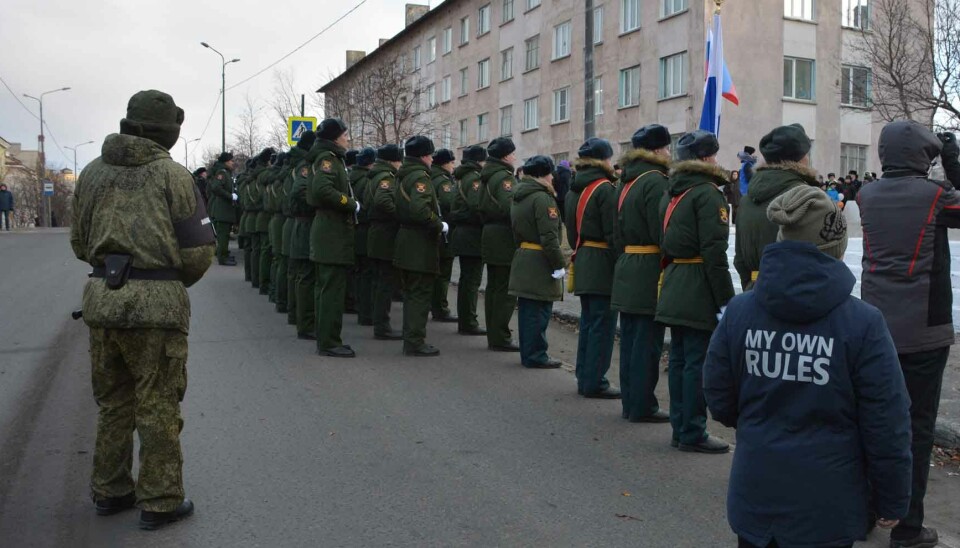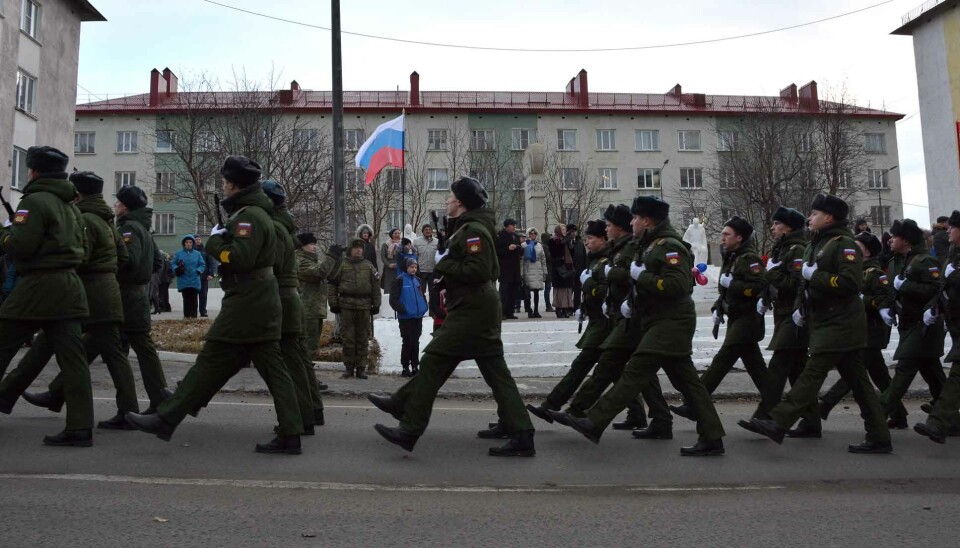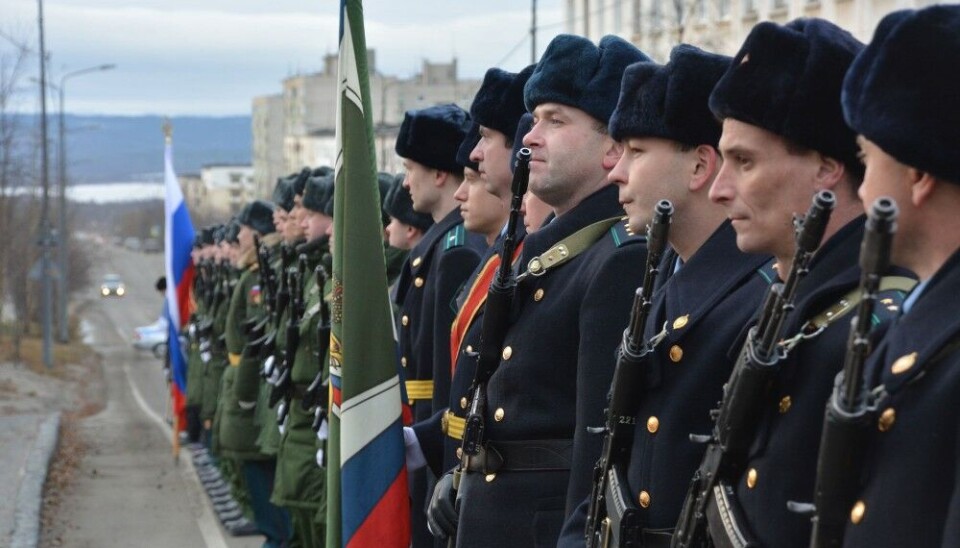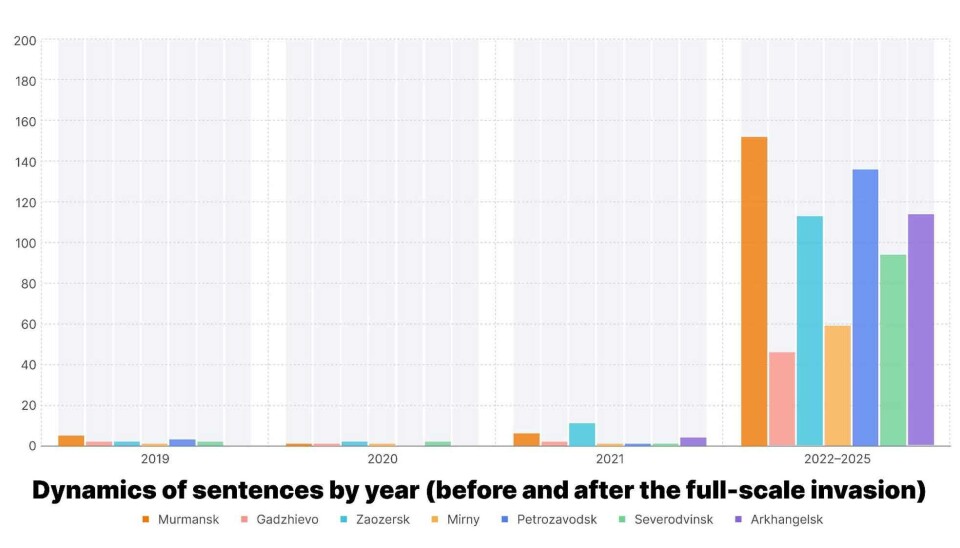
Tens of thousands of Russian soldiers have fled the war
Since the start of the full-scale invasion of Ukraine, Russian military courts have handed down mass sentences on desertion and simulation of illness. In the Kola Peninsula and other north Russian regions, the number of cases exceeds 800.
Russian garrison courts have busy days as the number of Russian soldiers fleeing war is soaring. Back in 2021, such cases were rare, but since 2022 - there have been tens of thousands across the country. The Barents Observer counted the number of verdicts issued by military courts in the northern regions of Russia.
In Russian criminal law, military refusal to serve is divided into several categories. Unauthorized abandonment of a unit (Article 337 of the Criminal Code of the Russian Federation) is when a serviceman leaves his place of service without permission, but without the clear intention to completely evade service.
Desertion (Article 338) is a more serious crime: a conscious and final departure with the intent not to return. Sometimes the investigation starts the case as desertion, but courts often reclassify it as unauthorized absence — especially if the serviceman returns voluntarily.
Faking illness (Article 339) is another way of evasion, where a serviceman tries to avoid service by pretending to have health problems. However, cases under this article are not initiated very often.
The difference between the articles is primarily in the wording and maximum terms: desertion carries up to 15 years, unauthorised absence up to 10, and faking illness also up to 10 years.

Military towns in the Kola Peninsula
The Murmansk Region is the only region in the north where six garrison military courts operate simultaneously. This is directly related to the region's dense military presence: the Northern Fleet is based here along with strategic submarines, air defence units and coastal troops.
Almost every second settlement in the region is a garrison town. Severomorsk, Polyarny, Gadzhievo, Zaozyorsk, Pechenga, Alakurtti, Vidyayevo - all these towns exist around military service. It was here that mobilisation and participation in the war was felt first and foremost, and it was here that there was a sharp increase in criminal cases against those who decided to refuse to fight.
The Murmansk Garrison Military Court issued 152 sentences in the course of the two first years of full-scale war, mainly under the article on unauthorised absence from the unit. Only three cases concerned desertion, although prosecutors often try to initiate cases with this more serious article.
One of the few sentences of desertion, the text of which was made publicly available, is the case of Yevgeny Safonov, a contract soldier of the Northern Fleet. He twice left the unit without permission. In one of the episodes, he returned, but instead of starting service, he climbed over the fence and left, not answering calls from the command. The court regarded this as failure to report for duty during mobilisation. Initially, he was accused of desertion, but the court mitigated the article and sentenced Safarov to three years in a general prison colony.
In the Gadzhiyevo Garrison Court, there have been 46 sentences since February 2022. For comparison: in 2021, there were only two such cases, in 2020 — one, in 2019 — two. An increase of more than twenty times.
In Severomorsk, where the headquarters of the Northern Fleet is located, 22 sentences have been issued since the start of the full-scale invasion. Before the war, there were only a few cases per year. In Zaozersk, there are another 113. In 2021, there were eleven cases here, in 2020 — two.
In Severomorsk, there is also another legal body — the Northern Fleet Military Court. It hears appeals against decisions of lower courts in the Arkhangelsk and Murmansk regions. Since October 2022, the court has issued 272 decisions on “military” articles.

Barents Observer spoke with one of the Russian 'refuseniks' — the 29-year-old Dmitry Vasilets, a former serviceman of the Northern Fleet. He spent a year and three months in a settlement colony to avoid returning to the war in Ukraine. According to Vasilets, he refused to carry out combat orders on moral grounds after the death of two close friends. In the interview, he said that in his brigade, at least five or six officers followed the same path, preferring to admit guilt and serve real terms — albeit minimal — rather than being sent back to the front.
The Arkhangelsk region
In the Arkhangelsk region, cases of refusal to serve are distributed among three garrison courts — in Arkhangelsk, Severodvinsk, and Mirny. Each of them reflects its military landscape: from coastal units to missile units and strategic facilities.
The Arkhangelsk garrison court recorded 114 sentences under 'military' articles. It is the largest court in the region by the number of cases, considering cases of both contract soldiers and those mobilised from support and communication units.
In Severodvinsk — a city where the Sevmash and Zvezdochka yards are located, building nuclear submarines for the Navy and carrying out their repairs — there is a separate garrison court. It has 94 sentences to its credit. Court decisions are not published, but the overall number shows that disciplinary and criminal pressure on those who do not want to serve remains high.
In Mirny — a city near the Plesetsk Cosmodrome — the situation clearly illustrates how quickly the workload on the garrison court can change. In 2022, there were no sentences here. In 2021, 2020, and 2019 — one case per year. And since the beginning of 2023 — 59 sentences, almost all under the article on 'absence without leave'.

Republic of Komi
In Komi, there is one military court in operation — the Vorkuta Military Court. After 2023, it started to publish decisions with the names of individuals involved. In total, there are 75 decisions on 'military' articles.
One of them is the case of V.V. Napalkov, convicted for two episodes of leaving his unit during the mobilisation period. He initially hid for three weeks, returned, then disappeared again for two months, living with friends and family.
The court sentenced Napalkov to 6 years and 6 months of imprisonment. He claimed he had received verbal permission to be absent, but the court did not believe him.
Republic of Karelia
The Petrozavodsk Garrison Military Court — the only military court in Karelia — has issued 136 sentences on military articles over two years of war. For comparison, in 2021, there was only one such case, in 2020 — none, and in 2019 — three. That is, over the entire preceding five-year period, there were only four sentences, but after the invasion — an average of five per month.
This court publishes decisions with open names, and some materials remain available on the official website.
Among these is the sentence of V.R. Nummert, a contract soldier who did not return from leave in the autumn of 2022 and hid with relatives for over a year, working in various jobs. In court, he explained his behaviour as a fear of going to war and a desire to "rest a little." The court did not accept these explanations and sentenced him to six years in a strict regime under Article 338 of the Russian Criminal Code.
All of Russia
If we add up all the mentioned decisions by garrison courts in northern Russia, there are more than 800 court decisions under Articles 337, 338, and 339 of the Criminal Code, starting from the spring of 2022. This is a minimum, as many courts do not publish decisions or hide them under general terms. The northern regions, especially those with military bases, are now areas where military personnel flee, hide, and fake illness. And military courts are increasing the flow of sentences.

The north is not the only region in Russia where mass refusals to participate in the war are recorded. According to an internal presentation for Russian officials, published by the Ukrainian community InformNapalm and analysed by Frontelligence Insight, the total number of documented cases of refusal to serve, including unauthorised absence, in 2024 amounted to 50,554. Most criminal cases were initiated in the Southern Military District — almost 12,000, of which 58% were mobilised from the so-called "LDNR," report newspaper Important Stories.
BBC reported that in Ukraine, since the start of the full-scale invasion, more than 95,000 cases of desertion and unauthorised absence from duty have been opened. This is about 10% of the Ukrainian army.
The human rights project “Go to the Forest” helps Russians who refuse to fight.
“From the first days of mobilisation, we have been doing everything to help Russians evade conscription, leave the country, find asylum, and much more. Just so that as few people as possible pull the trigger. More than 46 thousand people have already received help,” state the human rights activists.






















